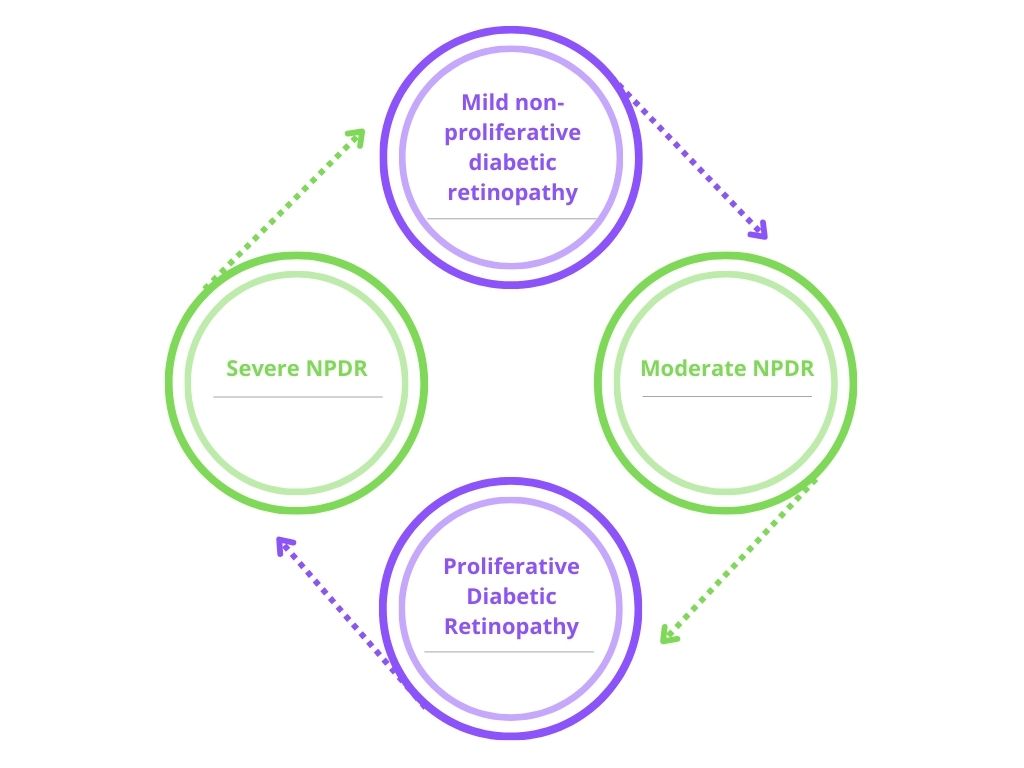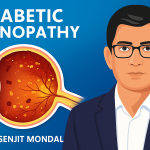
Do you know?
Diabetic retinopathy is a complication of diabetes, caused by high blood sugar levels damaging the back of the eye (retina), Diabetic Retinopathy Doctor in Kolkata. It can cause blindness if left undiagnosed and untreated. However, it usually takes several years for diabetic retinopathy to reach a stage where it could threaten your sight. Anyone with type 1 diabetes or type 2 diabetes is potentially at risk of developing diabetic retinopathy.
Diabetic retinopathy is a complication of long-standing diabetes that affects vision. It describes damage to the retina, the light-sensitive layer at the back of the eye that is responsible for transmitting nerve impulses to the visual centres in the brain via the optic nerve. Diabetes mellitus is characterized by a persistent high blood sugar level. This can eventually damage the small blood vessels that supply the retina with nutrients and oxygen. The retina is then starved of vital nutrients as well as being potentially exposed to leakage from the damaged blood vessels which can blur vision. Without treatment, diabetic retinopathy can lead to a complete loss of vision.
How Diabetes Affects the Eyes
If you are diabetic, you are at risk of falling victim to diabetic retinopathy. The high level of sugar in your blood causes damage to the tiny blood vessels in the retina. This leads to leakage and the growth of abnormal blood vessels. As the condition progresses, the fatality increases. For a better understanding, these are the ways diabetes affects your eyes:
These look like small dust specks or threads wandering in your visual field.
You might see sudden light flashes on the peripheral side of your vision field.
You might see a dark shadow moving across your vision field.
You might feel as if your vision is distorted. Straight lines will appear as if they are bent. Your central vision might also get blurred.
Risk Factors for Diabetic Retinopathy
The risk factors of diabetic retinopathy can be divided into two possible sections: Controllable and Uncontrollable.
Controllable
- Poor Sugar Control: Unmoderated sugar levels can act as a major risk factor for diabetic retinopathy.
- High Blood Pressure: High levels of blood pressure increase the chances of diabetic retinopathy. If it exists prior to such a high level of pressure, it leads to further complications.
- High Cholesterol: High fat levels in the blood increase the risk of diabetic retinopathy significantly.
- Obesity: High body mass (BMI) is a notable risk factor.
Uncontrollable
Timespan of Diabetes: If you have been suffering from diabetes for a long time, you are at a higher risk of developing diabetic retinopathy.
Ethnic Factors: Specific ethnic groups, such as African Americans and Hispanic people, are more likely to develop this condition.
Other Conditions: Other conditions, such as pregnancy, are a significant concern as they can elevate your chances of having diabetic retinopath
Symptoms of diabetic retinopathy
In the early stages, there may be no symptoms of diabetic retinopathy, and the condition may go unnoticed. If symptoms are present, they may include:
- "Floaters" or shapes that float in the visual field
- Difficulty seeing in dim light or at night
- Blurred vision
- Sudden loss of vision
Pathology of diabetic retinopathy
The retina lies at the back of the eye and is provided with a supply of blood vessels and nerves. In the initial stages of diabetic retinopathy, Diabetic Retinopathy Doctor in Kolkata the blood vessels that supply the retina develop tiny swellings called microaneurysms which are prone to hemorrahge.
In addition, the interruption to the supply of nutrients and oxygen triggers the formation of new blood vessels across the eye. However, these new blood vessels are brittle and also prone to breakage. Both the microaneurysms and the new blood vessels may rupture causing the leakage of blood into the retina and blurred vision.Eventually, new blood vessels, aneurysms and scarring may occur all over the retina, including the central part of the retina called the macula which is responsible for central vision. This can cause a reduction in eye sight or in more advanced cases, a complete loss of vision.


Stages of Diabetic Retinopathy

Mild non-proliferative diabetic retinopathy
This stage heralds the start of the damage. This is characterised by tiny bulges in the retinal blood vessels and minor leakage. Your vision will be somewhat normal at this stage.
Moderate NPDR
At this stage, more blood vessels start getting blocked. This restricts oxygen flow into the retina. Leakage of fluid might lead to haemorrhage.
Severe NPDR
At this stage, the widespread blockage of blood vessels has already started. Some areas of the retina are completely deprived of oxygen. The abnormal growth of blood vessels also starts. Due to macular oedema, you might face vision issues.
Proliferative Diabetic Retinopathy
A large number of abnormal blood vessels grow in the retina. These are delicate and often lead to bleeding. At this stage, your vision might be blocked by the appearance of floaters and starbursts in your visual field.
Diagnosis, screening & treatment
Blindness caused by progressive retinopathy cannot be reversed so it is important to prevent progression in the early stages. All diabetics aged 12 years or more need to be screened for diabetic retinopathy annually. The retina is visualized using an ophthalmoscope or fundoscope and angiography may be used to confirm a diagnosis.
Treatment for retinopathy depends largely on the stage of the condition. In the early stages, stringent control of blood sugar levels is one of the best ways to treat the condition, Diabetic Retinopathy Doctor in Kolkata. In more advanced cases, laser surgery of the retina may be recommended.
Prevention of Diabetic Retinopathy
The best and most effective way to combat diabetic retinopathy is to maintain strict control over your blood sugar levels. Strict control must also be ensured over blood pressure levels. Apart from this, other prevention tips are:
Eating a balanced diet: Prioritise a diet consisting of sugar, salt, and fat. Also include fish, fresh foods, and vegetables.
Maintaining a healthy weight: Losing excessive weight can help you keep your diabetes under control.
Refrain from Smoking and other bad habits: Avoid engaging in activities such as smoking or drinking.
Exercise daily: In order to keep your diabetes under control, you must aim to do exercise for at least 30 minutes every day.
For more information, visit Dr. Prosenjit Mondal, a diabetic retinopathy doctor in Kolkata.
FAQ
What is diabetic retinopathy?
Diabetic retinopathy is an ocular condition that is caused by damaged retinal blood vessels. As suggested by its name, diabetics are the most vulnerable to this.
Who is vulnerable to diabetic retinopathy?
People suffering from Type 1 or Type 2 diabetes are the most vulnerable to diabetic retinopathy.
What are the symptoms of diabetic retinopathy?
Some symptoms of diabetic retinopathy are: Blurred vision Seeing dark spots Night vision struggles Total loss of vision (in severe cases) If you are suffering from any of these symptoms, visit Dr. Prosenjit Mondal, a diabetic retinopathy doctor in Kolkata.
How to diagnose diabetic retinopathy?
Under Dr. Prosenjit Mondal, a diabetic retinopathy doctor in Kolkata, the tests you might have to go through are Optical Coherence Tomography (OCT) and fundus photography.
How can you prevent diabetic retinopathy?
Diabetic retinopathy can be prevented by: Eating a balanced diet Maintaining optimum weight Exercising regularly
Name some treatment options for diabetic retinopathy.
ome treatment options for diabetic retinopathy include: Anti-VEGF injections Vitrectomy Surgery Laser Therapy Dr. Prosenjit Mondal, a diabetic retinopathy specialist in Kolkata, offers all these treatments.
Is it possible to cure diabetic retinopathy?
No, it is not possible to treat diabetic retinopathy. It can only be managed by medications and treatment.
I have diabetic retinopathy. How often should I get my eyes checked?
It would be ideal for you to undergo a check-up twice a year.
Can vision loss be reversed?
No, the loss of vision due to diabetic retinopathy cannot be reversed.
If I control my blood sugar, will my diabetic retinopathy be under control?
Yes, if you control your blood sugar, your diabetic retinopathy will be under control.
